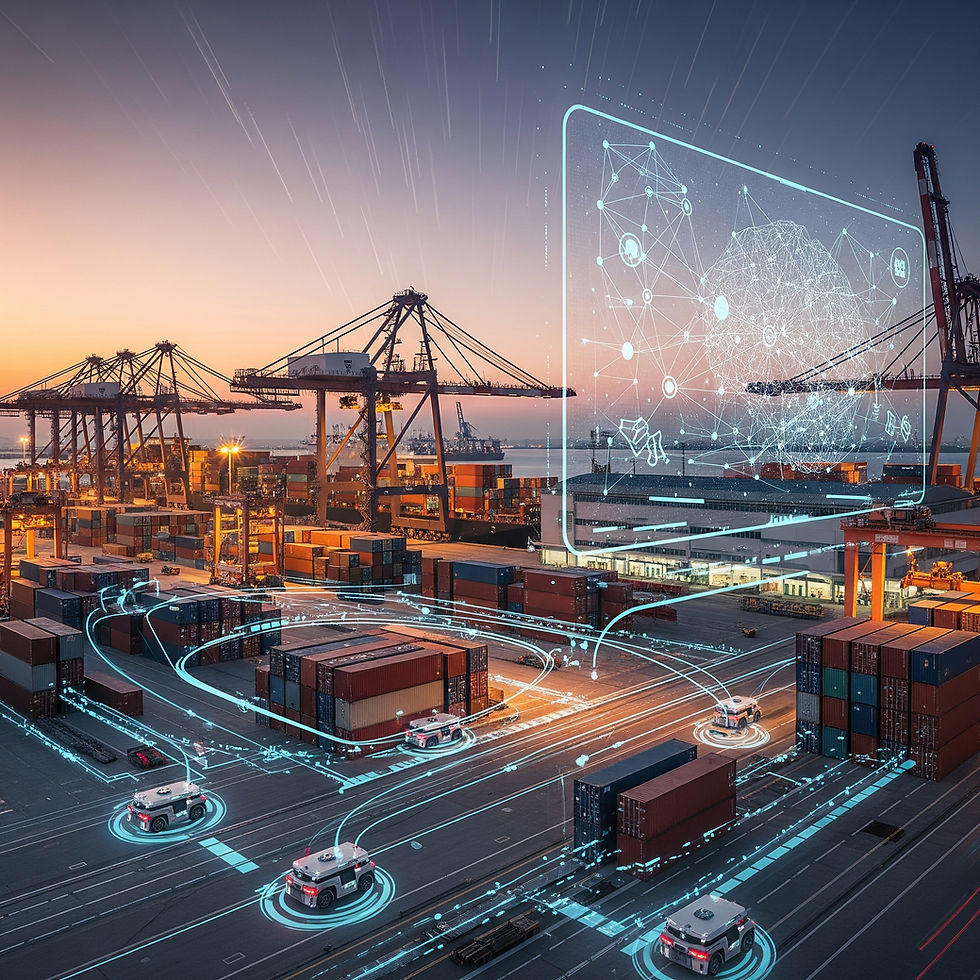Agentic AI in Logistics: Use Cases That Fit (and Don’t)
- Sep 3, 2025
- 3 min read
Updated: Jan 9
As logistics companies explore artificial intelligence (AI) to increase efficiency and reduce costs, a critical question emerges: What kinds of problems are well-suited to agentic AI?
And equally important: Which are not?

Agentic AI refers to systems that can reason about goals, select tools, and autonomously carry out tasks, much like a digital employee. These agents are typically powered by large language models (LLMs), such as OpenAI's GPT-5, and operate very differently from traditional automation tools.
Our platform is a workflow automation solution for supply chain and logistics, similar to Zapier, but purpose-built for APIs, event-driven processes, and integrations in the supply chain and shipping space. We’ve built the infrastructure to support automation and are helping logistics leaders understand where agentic AI may offer value.
Ideal Use Cases for Agentic AI in Logistics
Agentic AI is most useful when workflows involve unstructured data, unclear instructions, or frequent exceptions. These are tasks where human operators currently interpret intent and make judgment calls.
RFQ Automation Across Multiple Carriers
"Get quotes from the top three carriers for this lane."
Agents can:
Parse user input (email, spreadsheet, portal entry)
Normalize shipment data (locations, weight, NMFC, etc.)
Submit quote requests via different carrier APIs or portals
Compare and return the top results
Document Understanding (BOLs, Rate Confirmations, Invoices)
"Extract shipper, consignee, and line items from this PDF."
Agents can:
Use OCR or document parsers
Translate scanned or photographed documents into structured formats
Interface with your ERP or TMS to match entities
Email and Chat Triage
"Customer says their delivery is late. What should we do?"
Agents can:
Read and understand natural language inquiries
Cross-reference tracking data
Compose and send appropriate responses or escalate when needed
Exception Handling and Proactive Monitoring
"Notify the customer and offer re-routing if a delay is detected."
Agents can:
Monitor multiple data sources (carrier APIs, weather, tracking updates)
Detect disruptions
Choose a course of action and communicate it
Multi-System Data Mapping
"This vendor uses different SKUs. Normalize it for our warehouse."
Agents can:
Translate fields across disconnected systems
Apply mapping logic and even infer missing data
Poor Use Cases for Agentic AI in Logistics
There are important limitations to current LLM agents. They're not ideal for:
Highly Regulated or Precision-Critical Tasks
Example: Customs declarations, hazmat filing, dangerous goods classification
These require deterministic outcomes, strict validation, and legal compliance
High-Volume, Low-Variation Tasks
Example: Push every status update to a TMS
Better handled by workflow automation engines (like ours)
Systems with Complex or Deeply Nested APIs
Example: Booking freight with 100+ parameters including package specs, handling units, accessorials
LLMs struggle with deeply structured schema without simplification
Sensitive Data or Unfiltered Access
Example: Billing systems, financial transactions, user accounts
Agents must be heavily gated and observed when touching secure systems
Multi-Step Legal or Financial Approval Chains
Example: Approving credit or filing disputes
These require strict human-in-the-loop controls
How to Identify a Good Agent Use Case
Ask:
Would a person be needed to interpret vague input?
Is the process dependent on real-time judgment?
Are the inputs messy (email, PDF, user text)?
Are multiple tools/systems involved with no single rule set?
Is the output non-critical or easy to double-check?
If the answer to most of these is YES, it’s a good candidate.
If the answer to most is NO, use workflow automation.
Build the Foundation First
Agentic AI needs structure to succeed:
Clean, consistent APIs
Tool wrappers with clear inputs/outputs
Data normalization standards
Human override options
Our platform helps you build these foundations today, so that as agentic AI matures, you’re ready to plug it in.
Final Take
Agentic AI can be transformative — but it’s not for everything. Focus your exploration on exception-heavy, decision-driven, or data-wrangling tasks.
Leave the rest to orchestration and deterministic automation.
We're excited about this future, and we’re building the infrastructure to support it.
Get Started
Explore our logistics automation platform
Book a call to evaluate your workflows
Subscribe below to our newsletter to learn more about agentic AI



Comments